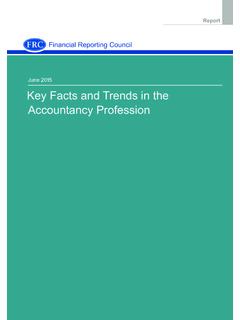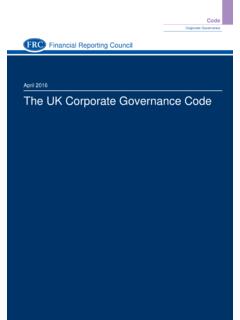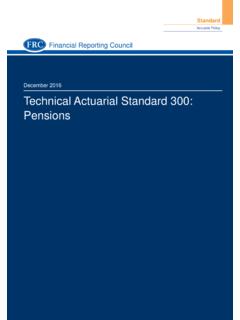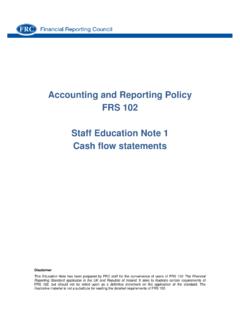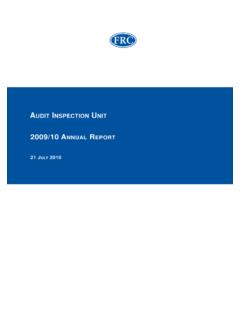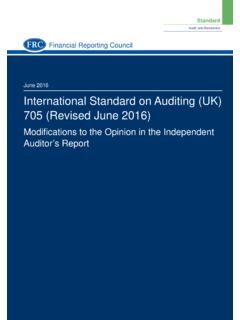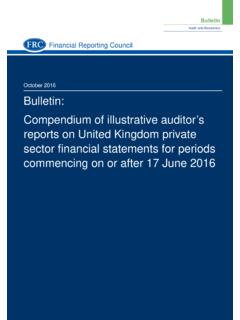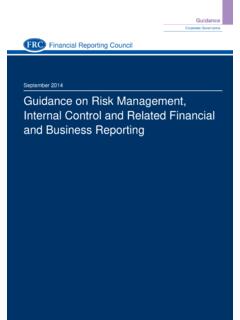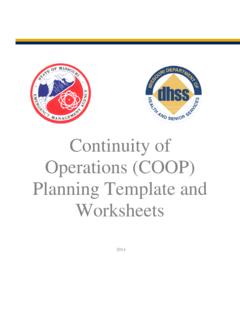Transcription of GUIDANCE ON BOARD EFFECTIVENESS - frc.org.uk
1 GUIDANCE ON BOARD EFFECTIVENESSJULY 2018 Financial Reporting CouncilThe FRC s mission is to promote transparency and integrity in business. The FRC sets the UK Corporate Governance and Stewardship Codes and UK standards for accounting and actuarial work; monitors and takes action to promote the quality of corporate reporting; and operates independent enforcement arrangements for accountants and actuaries. As the Competent Authority for audit in the UK the FRC sets auditing and ethical standards and monitors and enforces audit FRC does not accept any liability to any party for any loss, damage or costs howsoever arising, whether directly or indirectly, whether in contract, tort or otherwise from any action or decision taken (or not taken) as a result of any person relying on or otherwise using this document or arising from any omission from it. The Financial Reporting Council Limited 2017 The Financial Reporting Council Limited is a company limited by guarantee.
2 Registered in England number 2486368. Registered Office: 8th Floor, 125 London Wall, London EC2Y Leadership and Company Purpose An effective BOARD Relations with stakeholders32 Division of Responsibilities Role of the chair BOARD committees Role of the senior independent director Role of executive directors Role of non-executive directors BOARD support and the role of the company secretary183 Composition, Succession and Evaluation Role of the nomination committee Succession planning Length of service of the chair and non-executive directors Evaluating the performance of the BOARD and directors244 Audit, Risk and Internal Control315 Remuneration Role of the remuneration committee34 Appendix AOther sources of information38 Appendix BDisclosure of corporate governance arrangements and overlap with the FCA Handbook391 GUIDANCE on BOARD EFFECTIVENESS 2018 INTRODUCTION1. The primary purpose of the GUIDANCE on BOARD EFFECTIVENESS (the GUIDANCE ) is to stimulate boards thinking on how they can carry out their role and encourage them to focus on continually improving their EFFECTIVENESS .
3 2. Ultimately, it is for individual boards to decide on the governance arrangements most appropriate to their company s circumstances, applying the Principles of The UK Corporate Governance Code (the Code) and following good practice set out in the Code provisions and supplemented in this The GUIDANCE is not mandatory and is not prescriptive. It contains suggestions of good practice to support directors and their advisors in applying the Code. We encourage boards to refer to the GUIDANCE alongside the Code. The GUIDANCE will be updated periodically as good practice The GUIDANCE will also be helpful to a wide range of stakeholders when assessing the actions taken by the BOARD in relation to the governance of the The Code has evolved since it was first introduced in 1992. It has always placed great importance on clarity of roles and responsibilities, and on accountability and transparency.
4 While these are necessary for good governance, they are not sufficient on their own. The structures and processes that boards put in place are essential for them to function effectively and efficiently, but on their own they will not deliver Boards need to think deeply about the way in which they carry out their role. The behaviours that they display, individually as directors and collectively as the BOARD , set the tone from the The Code places considerable emphasis on decision-making and outcomes. It promotes a more inclusive approach to stakeholder engagement and encourages boards to reflect on the way in which decisions are taken and how that might affect the quality of those decisions. By encouraging a broader focus and a willingness to listen to different voices and influences, the Code, supplemented by the GUIDANCE , supports openness and accountability in delivering the long-term sustainable success of the The structure of the GUIDANCE follows the structure of the Code.
5 It primarily covers matters related to BOARD EFFECTIVENESS dealt within Sections 1-3 of the Code and matters related to remuneration dealt within Section 5 of the Code. The FRC has issued separate, in-depth GUIDANCE documents on audit, risk and internal control. Section 4 of the Code is therefore covered only briefly in the Reporting Council9. The GUIDANCE now includes some of the procedural aspects of governance which, historically, were covered by the Code. Such former features of the Code are now well-established as good practice and compliance levels are high. The GUIDANCE is intended to act as a reminder to boards and their support teams that good practice and procedure should continue to be The tools and techniques for BOARD EFFECTIVENESS suggested in the GUIDANCE will assist companies in applying the Principles in the Code and offer inspiration when it comes to illustrating in the annual report how this has been on BOARD EFFECTIVENESS 20181 BOARD LEADERSHIP AND COMPANY PURPOSEAN EFFECTIVE BOARD11.
6 An effective BOARD defines the company s purpose and then sets a strategy to deliver it, underpinned by the values and behaviours that shape its culture and the way it conducts its business. It will be able to explain the main trends and factors affecting the long-term success and future viability of the company1 for example technological change or environmental impacts and how these and the company s principal risks and uncertainties have been A company s purpose is the reason for which it exists. The BOARD is responsible for setting and reconfirming the company s purpose. A well-defined purpose2 will help companies to articulate their business model, and develop their strategy, operating practices and approach to risk. Companies with a clear purpose often find it easier to engage with their workforce, customers and the wider A sound understanding at BOARD level of how value is created over time is key in steering strategies and business models towards a sustainable future.
7 This is not limited to value that is found in the financial statements. An understanding of how intangible sources of value are developed, managed and sustained for example a highly trained workforce, intellectual property or brand recognition is increasingly relevant to an understanding of the company s performance and the impact of its activity. These are important considerations for boards when setting corporate Boards have a responsibility for the health of the company and need to take a long-term view. This is in contrast to the priorities of some investors, not all of whom will be aligned with the pursuit of success over the long-term. An effective BOARD will manage the conflict between short-term interests and the long-term impacts of its decisions; it will assess shareholder and stakeholder interests from the perspective of the long-term sustainable success of the company.
8 1 Provision 12 Principle B4 Financial Reporting CouncilQuestions for boards How do we know that management is identifying and addressing future challenges and opportunities, for example, changes in technology, environmental issues or changing stakeholder expectations? What proportion of BOARD time is spent on financial performance management versus other matters of strategic importance? Is the balance between the focus on immediate issues and long-term success appropriate? Are we playing an active role in shaping long-term investment plans to underpin delivery of strategy and value creation? Is sufficient BOARD time allocated to idea generation, opportunity identification and innovation? Are we using scenario analysis to help us assess the strategic importance and potential impact of our challenges and opportunities? Are we securing the benefits of big data to give us a competitive edge? How will we assess and measure the impact of our decisions on financial performance, the value for shareholders and the impact on key stakeholders?
9 Are shareholders driving the company to act in a way that is out of line with its purpose, values and wider responsibilities?15. Effective directors will understand their duties both collectively and individually. Directors duties are formally set out in sections 171 177 of the Companies Act 2006. Directors are expected to act in a manner consistent with their statutory duties, and to uphold the highest standards of integrity and support the chair in instilling the appropriate values, behaviours and culture in the boardroom and 16. The boardroom should be a place for robust debate where challenge, support, diversity of thought and teamwork are essential features. Diversity of skills, background and personal strengths is an important driver of a BOARD s EFFECTIVENESS , creating different perspectives among directors, and breaking down a tendency towards group think .17. Openness and accountability matter at every level.
10 Good governance means a focus on how this takes place throughout the company and by those who act on its behalf. The quality of governance will be evident in the way the company conducts business, for example, how it treats its workforce, customers and Principle B5 GUIDANCE on BOARD EFFECTIVENESS 201818. The BOARD sets the framework of values within which the desired corporate culture can evolve and thrive. Ownership of the values will be stronger if a collaborative approach is taken and both the leadership and the workforce are involved in a two-way process to define the company s It is important for trust that companies avoid giving contradictory messages through their decisions, strategies or conduct. Directors can reinforce values through their own behaviour and decisions. To do this effectively, executive and non-executive directors may need to increase their for boards How do we demonstrate ethical leadership and display the behaviours we expect from others?
